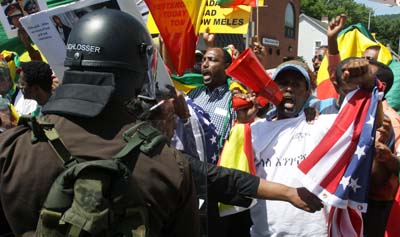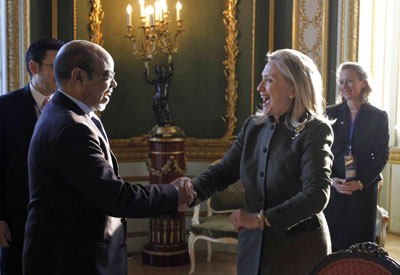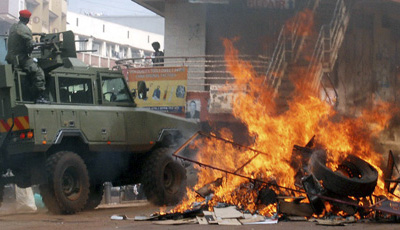
Members of Congress urge Meles to end repression
Two members of the U.S. Congress, a Republican and a Democrat, have publicly voiced indignation at Ethiopia’s persecution of journalists under the leadership of Prime Minister Meles Zenawi, with both declaring that stability and security are enhanced by press freedom.
Obama should raise press freedom in Africa food talks
New York, May 16, 2012–President Obama should acknowledge the role that independent news reporting plays in assessing agricultural challenges and facilitating the response to famine, the Committee to Protect Journalists stated in a letter to the White House. Ethiopia in particular downplays the extent of food crises and undermines the ability of donor nations and aid groups to help by denying journalists access to sensitive areas and censoring independent coverage.

In Ethiopia, new printing directive equals pre-censorship
New York, May 9, 2012–Ethiopia’s main, state-owned printing company has directed newspaper publishers to censor any content that may draw government prosecution under the country’s anti-terrorism law or face cancellation of their printing contracts, according to local journalists and news reports.

China’s media footprint in Kenya
Will China’s quickly expanding media presence in Africa result in a fresh, alternative, and balanced perspective on the continent–much as Al-Jazeera altered the broadcast landscape with the launch of its English service in 2006–or will it be essentially an exercise in propaganda?

Ethiopian paper fined for coverage of Eskinder Nega trial
New York, May 4, 2012–An Ethiopian court has cited the editor of a leading independent newspaper for contempt after his paper published the verbatim courtroom statement made by the imprisoned journalist Eskinder Nega during his trial, according to news reports. The Committee to Protect Journalists condemns the ruling, which illustrates the growing severity of censorship…

Blogger fights terror charges as Ethiopian leader praised
Last week in the Ethiopian capital, Addis Ababa, while Prime Minister Meles Zenawi was making a speech about Africa’s growth potential at an African Union forum, a journalist who his administration has locked away since September on bogus terrorism charges was presenting his defense before a judge. Eskinder Nega has been one of the most…

Attacks on the Press in 2011: Abolishing Censorship
Even as trade and new systems of communication turn us into global citizens, the information we need to ensure accountability often stops at national borders. New platforms like social media are valuable tools, but the battle against censorship is hardly over. By Joel Simon
